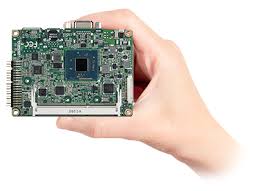 Advantech MI/O and the MIO-2263 Advantech MI/O and the MIO-2263
Explaining Advantech's MI/O Extension standard and a look at a super-compact Intel Bay Trail-powered MI/O-Ultra Single Board Computer as a economical, low maintenance building block for CNC and similar projects
(by Conrad H. Blickenstorfer)
This article is about Advantech's MI/O Extension standard, where MI/O stands for "multiple I/O." That doesn't say all that much, and so here's what Advantech is trying to do:
While there is a large number of different CPU board formats for embedded computer projects, each board format optimizes certain hardware standards and technologies, and each individual board product includes certain ports and I/O. The problem is that standards-based boards do not always support all interface requirements for a project, and despite the large number of board standards, there simply may not be one that exactly fits special project needs.
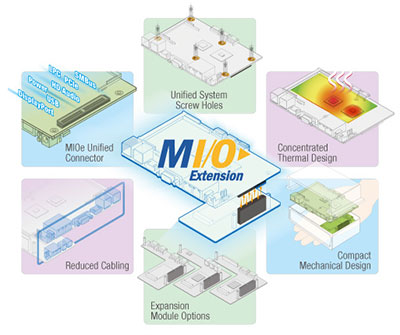 That's where Advantech's MI/O modular single board computer system comes in. It's a mix-and-match, flexible, extendable, expandable toolkit of boards and modules that can eliminate the extra time and cost required to design solutions from scratch. That's where Advantech's MI/O modular single board computer system comes in. It's a mix-and-match, flexible, extendable, expandable toolkit of boards and modules that can eliminate the extra time and cost required to design solutions from scratch.
In Advantech's experience, the conventional ODM system development timeline is six to eight months, depending on the complexity of the system. Using integrated MI/O Extension modules can significantly reduce the design time of the development process, offering more time for planning, validation, pilot runs and production, while often cutting total development time to just three or four months. That means time and money saved, and getting quicker to market.
Additional advantages are that customization requests can easily be filled with off-the-shelf MI/O extension modules, and mock-up costs are lower because all MI/O components can easily be reused. Advantech estimates that overall project cost savings using the MI/O Extension solution are at least 20% compared to traditional approaches.
Advantech's lineup of MI/O standard components and modules has been growing steadily. On the computer module side of things, there are currently two types, those being:
- MI/O-Ultra Pico-ITX measures 100 x 72 mm (same as a 2.5-inch disk) and is for ultra low power applications (under 8 watts) with simple I/O. These are geared towards price-competitive markets and size-sensitive devices, and they are based on AMD G-Series and Intel Atom (and now Bay Trail) processors.
- MI/O Compact measures 146 x 102 mm (same as a 3.5-inch disk) and is for TDPs up to 40 watts, rich I/O, and mid- to high-end performance. They may therefore include boards with up to standard voltage mobile Intel Core i3/i5/i7 processors and similar designs. The Compact Series also supports extended temperature design and comes with an Advantech iManager chip that provides a standardized API for common platform functions, and a self-management agent with software control functions (see iManager page and iManager white paper).
The illustrations below show design, size and layout of the two MI/O SBC types:
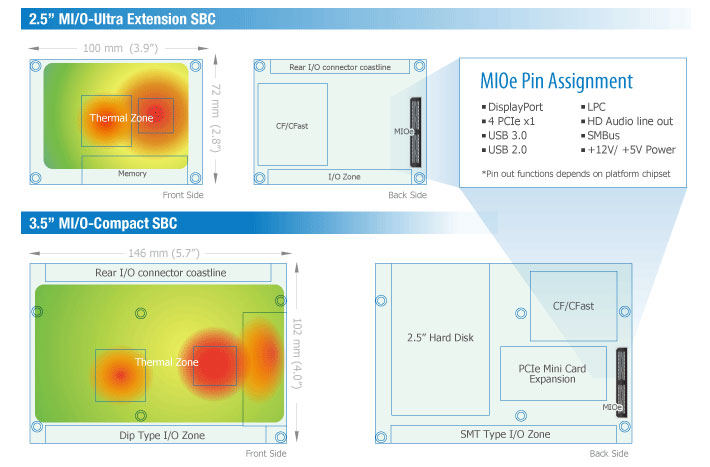
All MI/O Single Board Computers come with the MIOe unified connector extended interface that facilitates the stacking of modules available from Advantech or to third party ones developed by clients using the Advantech's design guide. The stacking connector comes in heights between 5 and 25mm, allowing a great variety of types and sizes of modules. A white paper entitled "Innovative MI/O Extension Single Board Computer" is available here.
The MIOe unified connector was created to provide maximum design flexibility. It includes:
- DisplayPort for HDMI, LVDS, DVI, CRT or eDP display interface
- PCIe x1 for GbE, USB 3.0, SATA/RAID, FPGA or PCI expansion
- USB 2.0/3.0 for high-speed storage, capture card, HD webcam and display interface
- LPC for legacy bus and multi-UART, PS2, GPIO, FDD, IR, Parallel port
- HD Audio for line out, keep flexibility with selected amplifier
- SMBus for GPIO control, smart battery/charger, W/R EEPROM
- Power is supported by the MI/O Extension SBC
Note that the screw holes in the MI/O system are standardized, too, for maximum ease of assembly, maintenance and upgrades. And all SBC modules are of concentrated thermal design, with all heat-generating elements on the topside for easy dispersing via a heatsink/heat spreader.
Example of a MI/O-Ultra Pico-ITX SBC module: the Advantech MI/O-2263
As stated above, Advantech's MI/O computer modules come in two size and performance classes. The larger 3.5-inch versions provide Intel Core processor level features ad performance, the smaller 2.5-inch versions are in the Intel Atom class, which now includes a large number of different Intel "Bay Trail" processors.
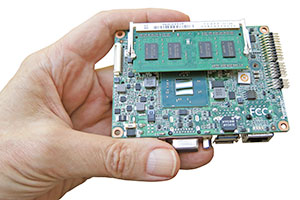 The MIO-2263, introduced in March 2015, is Advantech's first 2.5-inch MI/O-Ultra Pico-ITX single board computer module based on Intel's "Bay Trail" platform. Advantech sent us one for hands-on and our impressions. The MIO-2263, introduced in March 2015, is Advantech's first 2.5-inch MI/O-Ultra Pico-ITX single board computer module based on Intel's "Bay Trail" platform. Advantech sent us one for hands-on and our impressions.
The first thing you notice when unpacking the MIO-2263 is just how very small it is. In this day and age of waver-thin smartphones, ultra-powerful hardware has become commonly accepted. But when holding that tiny MI/O computer in your hand, a computer that's based on standard PC components and standard-size connectors and ports, it's still amazing to think that this little board can do essentially the same as a full-size ATX motherboard and, depending on the configuration, even more.
As is, Advantech offers the MI/O-2263 with two processor options. They are both from the Bay Trail lineup, but quite different. The lower-end Intel Atom E3825 is a dual-core, dual-thread chip running at 1.33GHz. The higher-end Celeron J1900 is a quad-core, quad-thread design that runs at 2GHz and also can go up to a "burst speed" of 2.42GHz. It has twice the L2 cache and its graphics run at a higher speed as well. The table below shows the pertinent specs of the two chips. If an Advantech MI/O project is on your shopping list, do take the time to carefully analyze the capabilities of the CPU options offered. Shopping by price alone isn't always the best approach as each Intel chip includes some features and technologies that may or may not be needed.
|
Available CPUs (see full specs)
|
Intel Celeron
|
Intel Atom
|
|
Model
|
J1900
|
E3825
|
|
Lithography
|
22nm
|
22nm
|
|
Cores/Threads
|
4/4
|
2/2
|
|
Base Clock Speed
|
2.00 GHz
|
1.33 GHz
|
|
Burst Frequency
|
2.42 GHz
|
No turbo
|
|
Thermal Design Power (TDP)
|
10 watts
|
6 watts
|
|
L2 Cache
|
2MB
|
1MB
|
|
Integrated graphics
|
HD Graphics (6 EUs)
|
HD Graphics (6 EUs)
|
|
Graphics base speed
|
688 MHz
|
533 MHz
|
|
Graphics max speed
|
854 MHz
|
533 MHz
|
A few words about Intel Bay Trail. The platform includes Atom, Celeron and even Pentium branded chips. That's a bit confusing as Intel traditionally used the Atom brand for its barest entry level processors, and the Celeron and Pentium brands as the low end of its Core processor lines.
That's now changed as all new "Bay Trail" chips, including those sold as Celerons and Pentiums, are based on a heavily overhauled and much more potent Intel Atom architecture. Note that Bay Trail includes GPUs that use the same Intel execution units (EUs) as the HD 4000 graphics in Intel's 3rd generation "Ivy Bridge" Core processors. This gives them support for most of the same APIs and features -- DirectX 11, OpenGL 3.X, and OpenCL 1.2 are all present on the API side, as is dual-display support. That's a massive step up from the notoriously marginal graphics of earlier Atom chips.
Our MIO-2263 evaluation unit came with the higher-end Celeron J1900 processor. We didn't get to benchmark it because it didn't come with storage and an OS, and we didn't want to just hook the module up to any old disk in our lab. However, we did recently test the Advantech ARK-1123 IoT gateway (see our review here) which also uses the J1900 and may actually have MI/O guts (we didn't open it). Its benchmark results are representative of what one can expect from the MIO-2263.
In our benchmarks, the J1900-based ARK-1123 scored a 787 in PassMark and 91,300 in CrystalMark. Those are numbers that we used to see in higher-end Core 2 Duo and even early Core-based systems, so this Bay Trail module is quick, and certainly a lot faster than anything based on any prior generation Atom chip. And a MIO-2263 with solid state disk could be much quicker yet as our ARK-1123 tester came with a comparatively slow rotating hard disk.
What could you expect from a MIO-2263 with the lower-end Atom E3825 processor? Again it'll depend on the type of mass storage, but probably not much more than half of what the J1900 can do. Of course, this being an embedded system, absolute performance doesn't matter; what matters is having precisely enough performance for the job at hand.
Below you can see the top (left) and bottom (right) of the MIO-2263 SBC. Note that the top picture (the one on the right) does not include the passive cooling sink that may be required to cool the processor and chipset.
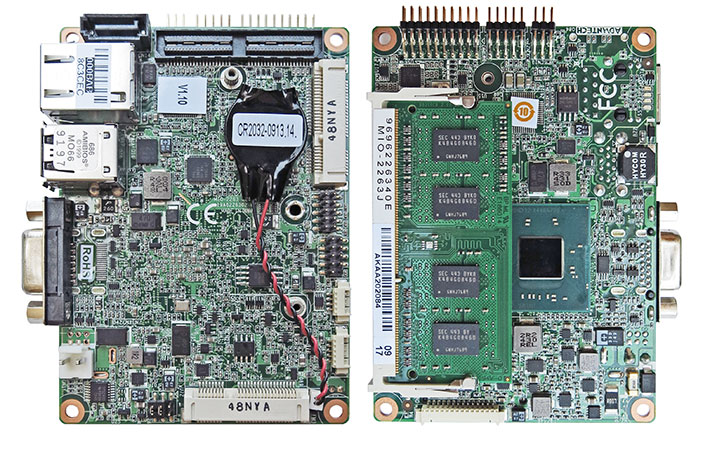
As of May 2015, Advantech offers 11 MI/O SBCs, eight MI/O extension modules, three MI/O extension evaluation boards, and three complete MI/O-based fanless embedded Box PCs. The expanding lineup is a smart bet as with the rapid growth of Internet of Things (IoT) and intelligent systems there is an increasing demand for all sorts of precisely tailored systems, and thus an escalating need for flexible, extensible tools and building blocks to quickly create whatever solutions are required to put those systems in place.
Below is a schematic of the Advantech MIO-2263 that shows how it all fits together:
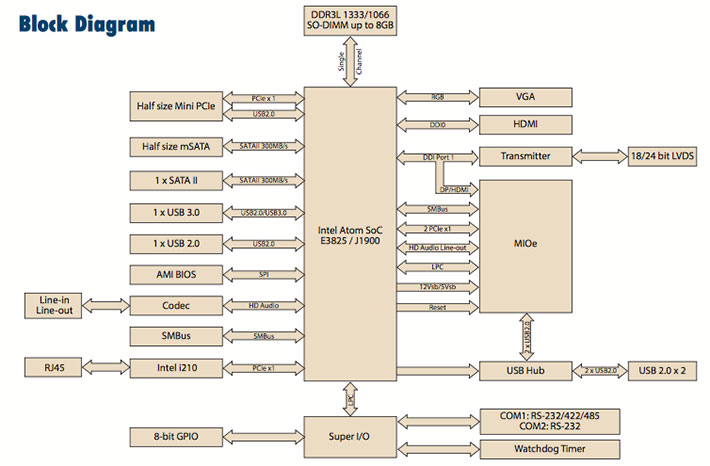
We're still in a relatively early phase of the MI/O Extension Single Board Computer standard (which Advantech makes available to others as well), but the significant growth in SBC and extension modules available from Advantech compared to last year would indicate that things are going well. Stackable modular systems architectures make a lot of sense. In this respect MI/O is in many respects similar to the PC104 standard with its stackable architecture, and has many of the same advantages.
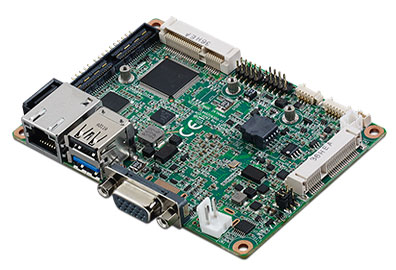 Add to that MI/O's special attention to optimal thermal design, minimal cabling, compact mechanicals and value-added integrated software services, and this new platform looks like a modern and promising solution in the integration-ready SBC space. Add to that MI/O's special attention to optimal thermal design, minimal cabling, compact mechanicals and value-added integrated software services, and this new platform looks like a modern and promising solution in the integration-ready SBC space.
Advantech sees applications in IoT projects, cableless factory automation, running multiple displays and cameras in transporation systems, ATMs, self service kiosks, surveillance, logistics, HMI, telecomm, medical, warehousing and many more.
As for the MIO-2263, it's a flexible, almost infinitely expandable and configurable, and super-compact embedded modular solutions board capable of — in its Celeron J1900 version — providing substantial processing and graphics performance. All at a very affordable cost.
To read more about the MI/O standard and products, check these resources:
Advantech MIO-2263 specs:
| Status |
Added 05/2015
|
| Type |
MI/O-Ultra Pico-ITX 2.5" Single Board Computer
|
| CPU Type |
Quad-core Intel Celeron J1900
Dual-core Intel Atom E3825
|
| Clock Speed |
J1900: 2.0GHz (2.42 burst speed)
E3825: 1.33GHz (no turbo/burst speed)
|
| Chipset |
Integrated
|
| BIOS |
AMI EFI 64Mbit
|
| Memory |
J1900: Up to 8GB DDR3L 1333 in 1 204-pin SODIMM socket
E3825: Up to 8GB DDR3L 1066 in 1 204-pin SODIMM socket
|
| Graphics Controller |
Integrated Intel HD Graphics |
| VGA |
Up to 2560 x 1600 pixel
|
| LVDS |
Single channel 24-bit LVDS, max resolution up to 1440 x 900
|
| HDMI |
Up to 1920 x 1080 at 60 Hz
|
| VGA |
Up to 2560 x 1600 at 60 Hz
|
| Dual display |
VGA + LVDS or HDMI + LVDS
|
| LAN |
1 x 10/100/1000Base-T (Intel i210) |
| SATA |
1 x SATA up to 300 MB/s, 1 x mSATA half-size mini PCIe |
| Expansion |
1 x half-size Mini PCIe, 1 x MIOe (SMBus, 2 x USB 2.0, LPC, 2 x PCIe x1, line out, DisplayPort/HDMI, power)
|
| SMBUS |
1 x SMBus
|
| USB |
1 x USB 2.0, 1 x USB 3.0
|
| Serial |
1 x RS232 from COM2, 1 x RS232/422/485 from COM1 with auto-flow control |
| Parallel |
NA |
| Audio |
Realtek ALC888S, HD Audio, Line-in, Line out |
| GPIO |
8-bit general purpose input/output |
| Watchdog Timer |
Yes, 255-level interval timer, setup by software
|
| Power |
12 Volt DC |
| Size |
100 mm x 72 mm (3.9" x 2.8")
|
| Weight |
0.46 kg (1.01 lb), weight of total package |
| Operating Temp. |
32° to 140°F (0° to 60°C)
|
| Price |
US$268 (Atom E3825), US$294 (Celeron J1900)
|
| Product page |
Advantech MIO-2263 |
| Datasheet |
Advantech MIO-2263 |
Advantech Corporation
13 Whatney
Irvine, CA 92618
Toll Free: 1-800-866-6008
Ph: 949-420-2500
Fax: 949-420-2501
ECGInfo@advantech.com
www.advantech.com
Advantech Co. Ltd.
No.1, Alley 20, Lane 26, Rueiguang Road
Neihu District, Taipei Taiwan 114, R.O.C.
Tel: 886-2-2792-7818
Fax: 886-2-2794-7301
www.advantech.com
|

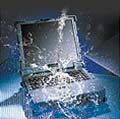



 Advantech MI/O and the MIO-2263
Advantech MI/O and the MIO-2263 That's where Advantech's MI/O modular single board computer system comes in. It's a mix-and-match, flexible, extendable, expandable toolkit of boards and modules that can eliminate the extra time and cost required to design solutions from scratch.
That's where Advantech's MI/O modular single board computer system comes in. It's a mix-and-match, flexible, extendable, expandable toolkit of boards and modules that can eliminate the extra time and cost required to design solutions from scratch.

 The MIO-2263, introduced in March 2015, is Advantech's first 2.5-inch MI/O-Ultra Pico-ITX single board computer module based on Intel's "Bay Trail" platform. Advantech sent us one for hands-on and our impressions.
The MIO-2263, introduced in March 2015, is Advantech's first 2.5-inch MI/O-Ultra Pico-ITX single board computer module based on Intel's "Bay Trail" platform. Advantech sent us one for hands-on and our impressions.


 Add to that MI/O's special attention to optimal thermal design, minimal cabling, compact mechanicals and value-added integrated software services, and this new platform looks like a modern and promising solution in the integration-ready SBC space.
Add to that MI/O's special attention to optimal thermal design, minimal cabling, compact mechanicals and value-added integrated software services, and this new platform looks like a modern and promising solution in the integration-ready SBC space.